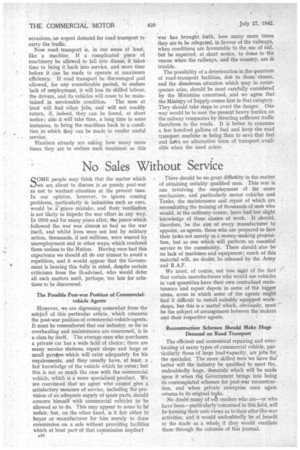No Sales Without Service
Page 18

If you've noticed an error in this article please click here to report it so we can fix it.
COME people may think that the matter which Owe are about to discuss is so purely post-war as not to wartant attention at the present time. In our opinion, however, to ignore coming problems, particularly in industries such as ours, would be a grave mistake, and their ventilation is not likely to impede the war effort 4n any way. In 1919 and for many years after, the peace which followed the war was almost, as bad as the war itself, and whilst lives were not lost by military action, thousands, if not millions, were wasted by unemployment and in other ways, which rendered them useless to the Nation. Having once had this experience we should all do our utmost to avoid a repetition, and it would appear that the Govern ment is bearing this fully in mind, despite certain criticisms from the ill-advised, who would defer all such matters until, perhaps, too late for solutions to be discovered.
The Possible Post-war Position of Commercialvehicle Agents However, we are digressing somewhat from the subjeci of this particular article, which concerns the post-war position of commercial-vehicle agents. It must be remembered that our industry, so far as overhauling and maintenance are concerned, is in a class by itself. The average man who purchases • a private car has a wide field of choice ; there are many service stations, repair shops and large or small garages which will cater adequately for his requirements, and they usually have, at least, a fair knowledge of the vehicle which he owns; but this is not so much the case with the commercial vehicle, which is a more specialized product. We are convinced that no agent who cannot give a satisfactory measure of service, including the provision of an adequate supply of spare parts, should concern himself with commercial vehicles or be allowed sd to do. This may appear to some to be' unfair, but, on the other hand, is it fair either to buyer or manufacturer for him merely to draw commission on a sale without providing facilities which at least part of that commission implies? There should be no great diffichlty in the matter of obtaining suitably qualified men. This war is one involving the employment of far more mechanism, and particularly motor vehicles and Tanks, the maintenance and repair of which are necessitating the training of thousands of men who would, in the ordinary course, have had but slight knowledge of these classes of work. It should, therefore, be the aim of every manufacturer to appoint, as agents, those who are prepared to face their tasks not merely as a money-making proposition, but as one which will perform an essential service to the community. There should also be no lack of machines and equipment ; much of this material will, no doubt, be released by the Army and R.A.F.
We must, of course, not lose sight of the fact that certain manufacturers who would use vehicles in vast quantities have their own centralized maintenance and repair depots in some of the bigger areas, areas in which some of the agents might find it difficult to install suitably equipped workshops, but this is a ;nattef which, obviously, must be the subject of arrangement between the makers and their respective agents.
Reconstruction Schemes Should Make Huge Demand on Road Transport The efficient and economical repairing and overhauling of many types of commercial vehicle, par-ticularly those of large load rapacity, are jobs for the specialist. The more skilled men 'we have the better will the industry be qualified to meet the, undoubtedly huge, demands' which will be made upon it when the Government brings into being its contemplated schemes for post-war reconstruction, and when private enterprise once again returns to its original tasks.
No doubt many of or readers who are or who have been—particularly concerned in this field, will be forming their own .Views as to their after-the-war activities, and it would undoubtedly be of benefit to the trade as a whole if they would ventilate these through the columns of this journal.




















































